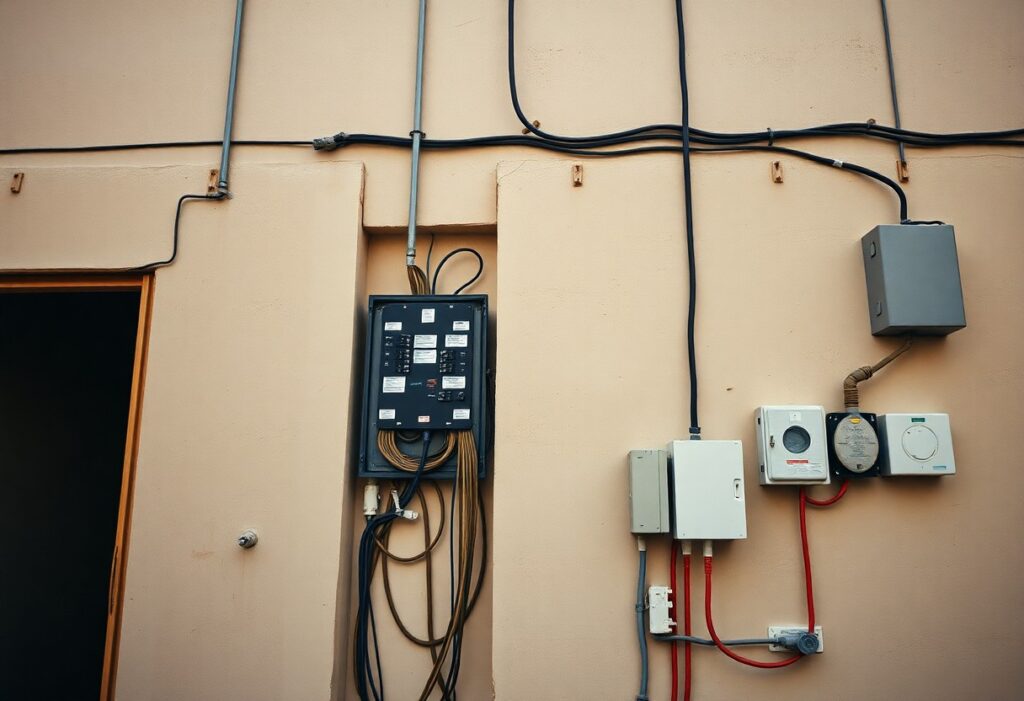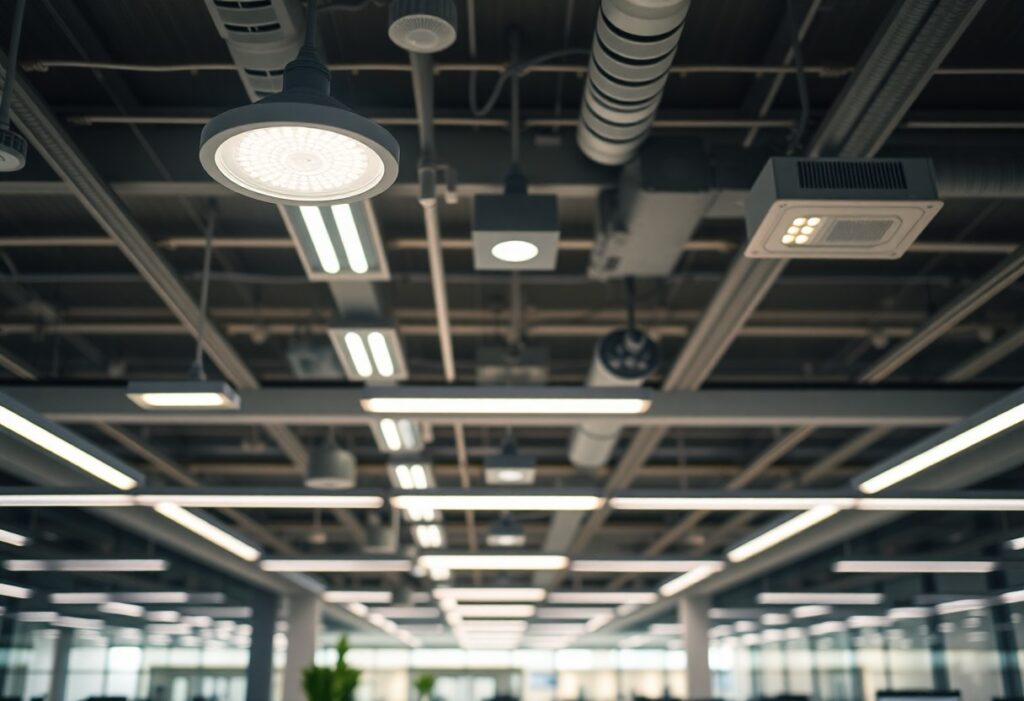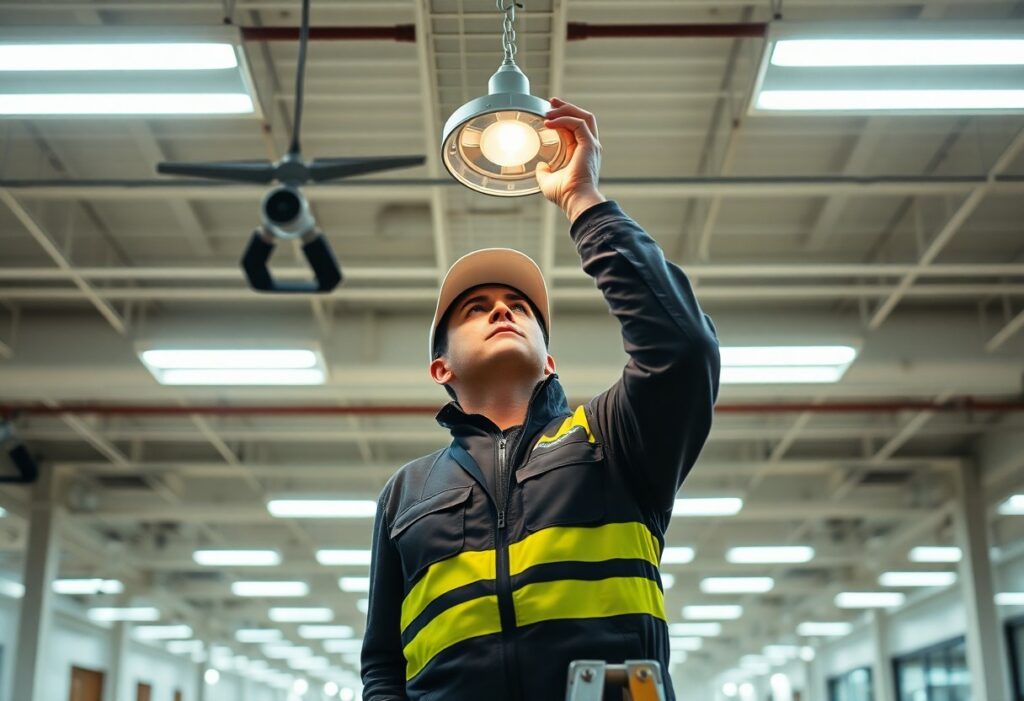You might not realize it, but the electrical panel in your commercial property is a vital component that ensures safety and operational efficiency. Regular inspections of your electrical panel not only help to prevent potential hazards and costly outages but also ensure that your electrical system can handle the demands of modern technology. By prioritizing these inspections, you protect your investment and create a secure environment for your employees and customers alike. Understanding the importance of these evaluations can ultimately lead to a more reliable electrical system and peace of mind.
Key Takeaways:
- Regular inspections can identify potential electrical issues before they lead to costly failures, ensuring seamless operations for commercial properties.
- Electrical panel inspections help maintain compliance with safety regulations and standards, reducing liability risks and protecting both employees and customers.
- By optimizing electrical efficiency, inspections can lead to lower energy costs and extend the lifespan of electrical equipment, contributing to overall resource management.

Understanding Electrical Panels
Before plunging into the importance of electrical panel inspections, it’s important to grasp what an electrical panel is and how it functions within your commercial property.
Definition and Function
By definition, an electrical panel, often referred to as a distribution board, is a central hub that distributes electricity from the main source to various circuits throughout your property. Its primary function is to ensure that electricity flows safely and efficiently to the devices and systems you rely on.
Components of an Electrical Panel
Electrical panels consist of several critical components that work together to manage electrical distribution.
Components include circuit breakers, bus bars, grounding terminals, and more. Circuit breakers serve as safety devices that automatically disconnect power in case of overload or faults. The bus bars distribute electricity to various circuits, while grounding terminals provide a path for excess electrical current to safely disperse. Regularly inspecting these components ensures they function correctly, protecting your property from potential electrical hazards.
Common Types of Electrical Panels
By understanding the various types of electrical panels, you can make informed choices for your commercial property. The main types include:
- Load Centers
- Main Panels
- Subpanels
- Combination Panels
- Transfer Switches
Recognizing the particular needs of your electrical system can help you select the right type for your property.
| Type of Panel | Function |
|---|---|
| Load Centers | Distribute electricity to various circuits. |
| Main Panels | Receive power from the utility and distribute it. |
| Subpanels | Provide additional circuit capacity in specific areas. |
| Combination Panels | Incorporate circuit breakers for both lighting and power. |
| Transfer Switches | Allow switching between power sources, like generators. |
Types of panels vary in function and application, and your choice should align with your property’s specific electrical needs. Additionally, each panel type has its unique features that can cater to unique wiring and load demands.
- Load Centers are best for distributing electricity to multiple circuits within a building.
- Main Panels serve as the backbone for any electrical system, linking your property to the grid.
- Subpanels allow for localized control of electrical distribution.
- Combination Panels save space by managing lighting and power in one unit.
- Transfer Switches are important for properties that require emergency backup power.
Recognizing the right type of electrical panel for your commercial space is important for safety and efficiency.
Importance of Electrical Panel Inspections
Now, understanding the importance of electrical panel inspections can have a significant impact on your commercial property’s safety and efficiency. Regular inspections can identify potential issues before they become major problems, ensuring your electrical system functions optimally and safely.
Ensuring Safety Compliance
Around the country, electrical codes and safety regulations are in place to protect both property and people. By conducting regular inspections of your electrical panel, you ensure compliance with these standards, which not only safeguards your employees and customers but also protects you from potential legal liabilities.
Preventing Electrical Fires
Fires caused by electrical faults can devastate properties and put lives at risk. Ensuring your electrical panel is thoroughly inspected helps identify outdated components, frayed wires, and overloaded circuits, all of which are common culprits in electrical fires.
Further, by proactively addressing these issues through regular inspections, you significantly reduce the likelihood of a fire breaking out in your commercial property. Regularly maintaining and inspecting your electrical panel contributes to a safer working environment and protects your investment in the long run.
Avoiding Equipment Failures
Around your commercial property, equipment ranging from computers to heavy machinery relies heavily on a well-functioning electrical system. Neglecting your electrical panel can lead to power fluctuations and outages, negatively impacting your operations.
Safety during inspections is necessary for identifying inefficiencies and potential failures in your electrical system before they disrupt your business. By being proactive, you protect your assets and ensure that your operations run smoothly, ultimately saving you costs associated with equipment downtime and repairs.
Signs Your Electrical Panel Needs Inspection
To ensure the safety and efficiency of your commercial property, it’s important to recognize the signs that may indicate your electrical panel requires an inspection. Neglecting potential issues can lead to serious consequences, including fire hazards and equipment failure. Staying informed will help you maintain a safe working environment. For more insights, check out this article on Understanding the Importance of Regular Electrical inspections.
Flickering Lights
Along with the signs of wear and tear, flickering lights in your commercial space often indicate underlying electrical panel issues. This can be a result of overloaded circuits or loose wiring, signaling that your electrical system needs immediate attention.
Strange Odors or Sounds
Electrical problems can manifest in strange odors or sounds coming from your panel. These can be indicators of overheating or faulty components, which pose significant risks if left unaddressed.
Also, if you detect a burning smell or notice crackling or buzzing noises, it’s important to turn off the power supply immediately and seek professional inspection. Ignoring these signs may lead to further damage or even fire hazards, jeopardizing your property and safety.
Frequently Tripped Breakers
Electrical panels that experience frequently tripped breakers should raise a red flag for you. This issue often indicates that the electrical panel is struggling to handle the load or that there is a fault somewhere in the system.
For instance, if your breakers trip multiple times in a short period, it could signify an overloaded circuit, which not only disrupts your operations but can also lead to permanent damage to your electrical systems. Addressing this promptly with an inspection will help avoid more severe problems down the line.
Age of the Panel
The age of your electrical panel is another critical factor to consider. If your panel is over 25 years old, it may not meet current safety standards and could be more prone to malfunctions.
Inspection of older panels is vital for ensuring your electrical system is up to code. Upgrading or replacing outdated components can enhance efficiency and safety, protecting your commercial property from electrical hazards.
The Inspection Process
After scheduling your electrical panel inspection, it’s important to understand what the process entails to better prepare your commercial property. The inspection is a thorough examination of your electrical panel and its components, ensuring everything operates safely and efficiently. Knowing what to expect can help facilitate a productive session with your inspector.
What Inspectors Look For
Above all, inspectors focus on identifying signs of wear and tear, such as melting, corrosion, or loose connections. They also check compliance with local building codes and safety standards. Other areas of concern include ensuring that circuit breakers function correctly and that overall panel capacity meets the demands of your facility.
Tools and Equipment Used
After the inspector’s arrival, they will utilize specialized tools and equipment to conduct a comprehensive assessment. This may include voltage testers, thermal imaging cameras, and digital multimeters, among others, to ensure precision in their findings.
What these tools do is allow the inspector to measure electricity levels, identify hotspots indicating potential overheating, and verify that all components function as they should. This helps identify underlying issues that might not be visible to the naked eye but could lead to significant problems if left unchecked.
Frequency of Inspections
Before entering into the scheduling of inspections, it’s important to consider how often these evaluations should occur. Regular inspections help maintain optimal performance, ensuring your electrical systems remain safe and reliable.
But depending on various factors such as the age of your electrical system, the load it handles, and any previous issues, you might require more frequent inspections. Generally, it’s advisable to have an inspection at least once a year, with more frequent checks for older systems or facilities with heavy electrical demands. By establishing a regular inspection timeline, you can minimize risks and ensure a smooth operation for your commercial property.
Choosing the Right Inspector
Keep in mind that selecting the right inspector for your electrical panel is vital for ensuring safety and compliance in your commercial property.
Qualifications and Certifications
About choosing an inspector, it is crucial to verify their qualifications and certifications. An inspector with the proper licenses demonstrates their expertise and adherence to local and national codes, ensuring that your electrical panel is in capable hands.
Questions to Ask Potential Inspectors
Around the selection process, take the time to ask potential inspectors specific questions about their experience and approach. This can include inquiries about their previous inspections, knowledge of the latest codes, and even their methods for detecting potential issues.
Consequently, asking tailored questions will help you gauge the inspector’s understanding and suitability for your unique requirements. Inquire about their experience with similar commercial properties, their familiarity with specific systems, and their approach to identifying and reporting deficiencies. This ensures that you choose someone who can address your particular concerns effectively.
Cost Considerations
Below the surface, it’s important to consider the cost of the inspection when making your selection. While you want to ensure a thorough examination, it’s wise to avoid choosing inspectors solely based on the lowest price, as this could impact the quality of the service.
Hence, weigh the cost of inspection against the value of the inspector’s experience and thoroughness. A slightly higher fee might translate to a more comprehensive evaluation and peace of mind knowing that your electrical system is safe and up to code. Don’t hesitate to request detailed quotes that itemize services offered to make a well-informed decision.
Case Studies and Real-World Implications
Many commercial properties have experienced serious electrical issues that highlight the necessity of regular electrical panel inspections. Here are several case studies that present alarming statistics and outcomes:
- Case Study 1: A retail store in Chicago encountered a fire due to faulty wiring in the electrical panel. The incident resulted in losses exceeding $250,000, and the store was closed for over three months.
- Case Study 2: An office building in New York City faced severe power outages stemming from an outdated electrical panel. This situation led to over 200 hours of downtime, affecting productivity and resulting in a financial loss of approximately $75,000.
- Case Study 3: A manufacturing facility in Dallas discovered that corroded connections in their electrical panel caused machinery failure, leading to repairs that cost $120,000. They later learned that a proper inspection could have flagged the issue early.
- Case Study 4: In Los Angeles, a restaurant was forced to shut down temporarily due to an electrical fire caused by overloaded circuits. The total damages, including loss of revenue, amounted to around $500,000.
For further insights into the significance of inspections, you can check out Why Regular Inspections are Essential for Commercial Properties.
Case Study: A Commercial Property Fire
Across the United States, a significant fire incident at a warehouse highlighted weaknesses in the electrical system. Faulty connections ignited conflagrations, causing millions of dollars in damages and lost inventory. Emergency responders noted that proper inspections prior to the incident could have identified the hazardous conditions, potentially averting disaster.
Lessons Learned from Electrical Failures
Commercial properties often underestimate the hazards linked to electrical failures. From numerous examples, it’s clear that early detection through inspections can prevent disastrous outcomes. Neglecting the integrity of your electrical panels may not only compromise safety but also lead to financial repercussions that can cripple your business.
From the various cases presented, property owners realized the importance of prioritizing maintenance and inspections. The financial implications of avoiding proper checks can lead to costly repairs, ongoing downtime, and even loss of tenants. Ensuring that your electrical systems are regularly monitored and maintained helps protect both your investment and the well-being of your staff and customers.
Benefits Realized from Regular Inspections
Besides safeguarding your property from electrical hazards, regular inspections yield numerous benefits. Properties that engage in routine assessments not only enjoy enhanced safety but also gain insights into areas needing upgrades or attention.
And, adopting a proactive approach through regular inspections can lead to a significant reduction in unexpected repair costs. You may also experience improved energy efficiency and an extended lifespan for your electrical systems, enhancing overall productivity and minimizing disruptions. Investing in scheduled evaluations demonstrates commitment to safety and can contribute to a positive business reputation in your community.
Final Words
Taking this into account, regular electrical panel inspections for your commercial property are vital for ensuring safety, efficiency, and compliance with regulations. By routinely assessing your electrical systems, you can identify potential issues before they escalate, thereby minimizing downtime and costly repairs. Your proactive approach not only protects your investments but also enhances the overall operation of your business. Investing in expert inspections reinforces your commitment to maintaining a safe working environment for your employees and customers alike.
Q: Why are electrical panel inspections crucial for commercial properties?
A: Electrical panel inspections are crucial for commercial properties because they ensure the safety and reliability of the electrical system. Over time, electrical panels can develop wear and tear, leading to potential hazards such as short circuits, overloads, or even fires. Regular inspections help identify these issues early, allowing for necessary repairs or upgrades to maintain safe operation. Moreover, many insurance policies and local regulations require routine inspections, making them not just a safety measure but also a compliance requirement.
Q: What are the signs that indicate a commercial property needs an electrical panel inspection?
A: There are several signs that indicate a commercial property may need an electrical panel inspection. These include frequent circuit breaker tripping, flickering lights, burning smells near the panel, discolored or warm panels, or if the property has undergone renovations that may have impacted the electrical system. Other considerations include the age of the panel—if it is older than 20 years—or if there have been any recent electrical surges or outages. If any of these signs are present, it is advisable to schedule an inspection promptly to ensure the electrical system is functioning properly.
Q: How often should electrical panel inspections be conducted for commercial properties?
A: The frequency of electrical panel inspections for commercial properties can vary based on several factors, including the type of business, the age of the electrical system, and local regulations. Generally, it is recommended to have a professional inspection conducted at least once every three to five years. However, businesses that have high electrical demands or have experienced recent electrical issues may benefit from more frequent inspections. Additionally, properties that have recently undergone significant changes, such as expansions or updates to the electrical system, should have an inspection to ensure everything is up to code and functioning properly.



